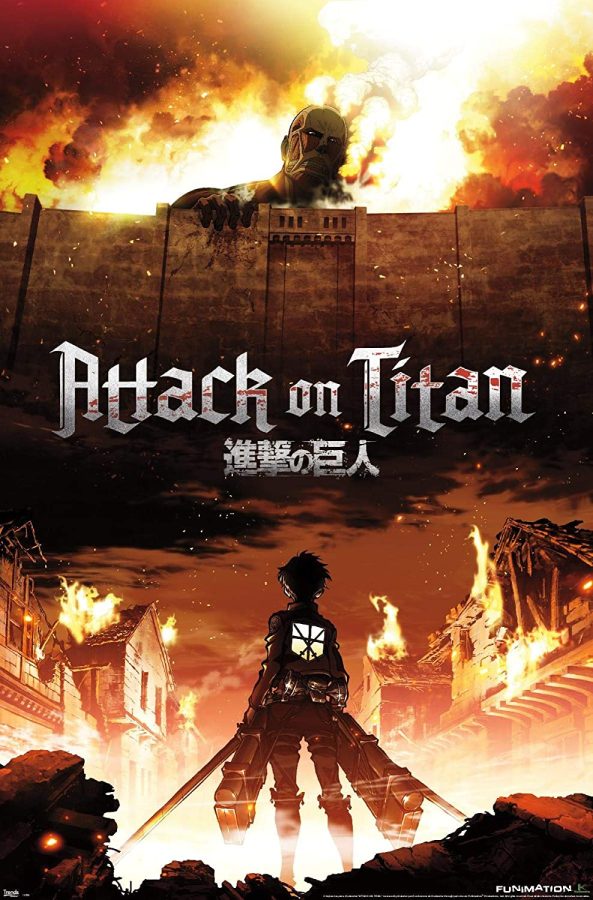Review: ‘Attack on Titan’ season four is a show-stopping finale
March 9, 2022
“Attack on Titan” is a dystopian action anime series adapted from the manga series “Shingeki no Kyojin” illustrated by Hajime Isayama. The final season was divided into two parts, the first released on Dec. 7, 2020 and the second premiered on Jan. 9 on Hulu and Crunchyroll.
In the chaotic world of “Attack on Titan,” the mystery of the titans is intertwined with constant plot twists and complex backstories weaving through the passage of time and it piques people’s curiosity.
It’s set on Paradise Island, a haven surrounded by three enormous walls: Wall Maria, Wall Rose and Wall Sheena. The once peaceful island was disturbed when an armored titan, a gigantic man-eating humanoid, broke into Wall Maria. This event forced Paradise Island’s royal government to send a branch of their military, the Survey Corp.
In the face of titans, with huge disparities in physical strength and supernatural abilities, humans are as vulnerable as ants. The show describes a society far from utopia, a purgatory where livelihoods are shattered at every turn, yet, it hints that this may just be the tip of the iceberg.
On the surface it’s an anime, but in reality, it’s more like a novel, a unique and honed fantasy with little fillers and an abundance of complexity. The anime begins with suspense, and the first and second seasons answer an important question: What is the world that lies outside the walls of Paradise Island? The audience, along with civilians living peacefully inside the walls, wants to understand what they are imprisoned by.
In this work, the protagonists Eren Yeager, Mikasa Ackerman and Armin Arlert promote the plot without dominating the story. More importantly, instead of just floating in the background, many supporting roles have independent arcs that create deep impressions on the audience. “Attack on Titan’’ is a group play; it shows shaky human nature under the agitation of the world’s contradictions. There is no absolute good and evil. The conflict between free will and rational order is an enduring problem and one of the main motifs throughout.
The world of “Attack on Titan” unravels the fear, helplessness, history and destiny that plagues the human condition. It also touches on the tenderness of pain, the heartaches of separations and the never-say-die destined pursuit of freedom. It is one of my favorite anime series. It retains seriousness, compassion and reality. I enjoyed “Attack on Titan” because of its complex dramatis personaes, character relationships and development.
Originally, when I first started watching the series, I wasn’t very fond of the 15-year-old Eren Yeager, who has too many repetitive traits other anime main characters share. As the plot progressed, however, I felt a sense of rebelliousness hidden under the surface of his warm-blooded kindness.
I admired Erwin Smith, the 13th commander of the Survey Corps, for his determination: “When necessary, we must be willing to take big risks and be prepared to lose everything.” I also appreciate Miche, a section commander of a major division of the Scout Regiment, for his persistence: “As long as we continue to fight, we are not beaten! Only when a person stops fighting do they lose.”
In this world, fate does not favor anyone. Captain Levi, a major character who is almost flawless, told Eren that he should make his own judgments. No one was a god in the world of titans, and no one could predict the future.
What is difficult in this world is not the bloody assault dominated by black and white values, but whether people still have the courage to devote themselves to the cause after seeing the absurdity of themselves, the world and even the ideal they once recognized.
Unlike works that fervently praise heroism, few of the characters fit the stereotype. Eren, Mikasa, Armin, Levi, Erwin and even Historia are all slaves of their own dreams and fate. They are all living in fetters and bound by their own missions. It pulled my heartstrings. The greatness of humankind lies in the continuous exploration of the unknown, to survive and progress.







